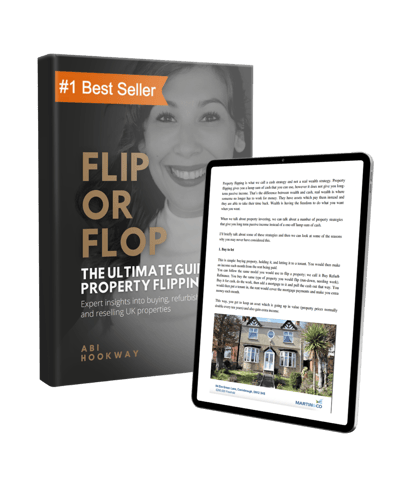Property flipping can be a very lucrative strategy. It is an increasingly popular tactic which can create a lot of money quickly.
Investing in property requires a range of skills and this is particularly true of property flipping. It is possible to be successful in flipping houses if you take the time to learn how to do it the right way. There are ways to shorten your learning curve and put safeguards in place to minimise your risks.
How do you flip your first home? This blog post explains.
What is property flipping?
Flipping is a type of real estate investment strategy in which an investor purchases a property not to use, but with the intention of selling it for a profit.
Investors who flip properties concentrate on the purchase and subsequent resale of one property or a group of properties. Many investors attempt to generate a steady flow of income by engaging in frequent flips.
How do you flip a home? In simple terms it is a buy-low-sell-high strategy. Rather than adopt a buy-and-hold strategy you complete the transactions as quickly as possible to limit the amount of time that capital is at risk. Each day that passes can cost more money (mortgage, utilities, property taxes, insurance, and other costs associated with home ownership).
House flippers take properties that most homebuyers aren’t able or willing to renovate, and improve them to the point where they meet buyer demand. Most average homebuyers want a home that is move-in ready, so house flipping investors put in a lot of effort for a shambled home to be completely redone and ready to move in without any further work needed. It takes time, labour and money.
Profit is typically derived from price appreciation resulting from a hot real estate market in which prices are rising rapidly or from capital improvements made to the property – or both. For example, an investor might purchase a fixer-upper in a “hot” neighbourhood, make substantial renovations and then offer it at a price that reflects its new appearance and amenities.
How much money can you make through house flipping?
Flipping a property in the UK can be very lucrative and it is easy to add tens of thousands in value.
The average salary in the UK is £30,000 and this can sometimes be generated in just one deal.
With property flipping, the investor can get a lump sum at the end of every project. There is no regular income like Buy-To-Let properties.
With house flipping:
Profit = Sale Price – Purchase Price – Cost
For example:
Purchase Price: £120,000
Cost (Refurb and fees): £20,000
Sale: £160,000
Profit: £20,000
Flipping a home means the price that it is bought for is below market value, and the strategy ensures it ‘realises’ its true value. This is achieved through fixing problems or making it more desirable.
Most non-investors want a nice home to move into without any problems. Structural issues can scare non-investors and they don’t want to fight to get a mortgage. This is where a property flipper comes in.
What skills do you need to be a successful property flipper?
Vision: To be able to identify a property that has the potential to realise value very quickly.
Numbers: Can the numbers be maneuvred to make an accurate projection of a property’s potential value and whether that can be realised cost-effectively, taking into account the buying price and ongoing cost.
Nerve: Can you stick to the plan even if costs are mounting up or you are struggling to sell the property?
Negotiation: Can you negotiate a workable buying or selling price to make the project profitable? This might involve a slightly different skill of buying a property at auction, which is a popular way for cheaper properties to be purchased.
Project management: As well as cost management, property flipping investors may need to employ contractors and personally manage the property refurbishments, taking into account time limits, costs and standards of work.
What are the advantages of flipping houses?
- Potential to make a huge profit
- Great for people with high skill levels
- Less risky than other types of real estate investing
- Gain useful real estate experience
- Gain greater insights into your local market
What are the disadvantages of flipping houses?
- Potential to lose money on investment
- May require costly outside help and support
- Requires intense planning and budgeting
- Unanticipated costs can arise, and they could be substantial
- Requires in-depth knowledge of the local real estate industry
Where can you find houses for property flipping?
To make a profit when flipping a house successfully, you need to buy at the right price.
There are a number of ways to do this, and it is worth putting the legwork in by contacting estate agents who will be selling properties that are in need of repair. Investors can also network with landlords who are looking to offload a property from their portfolio.
Auction houses: Finding the perfect property at the right price can be done at property auction. These take place regular at a large number of locations around the UK.
Follow these rules for auction success:
- Be selective when choosing to join a bidding war
- Research where properties are being snapped up quickly
- Research what properties buyers are wanting
- Target properties that appeal to the widest range of buyers
- Understand how the auction process works
- You will have a deadline to complete the purchase
- Consider whether you are paying in cash or need a bridging loan
- Once the hammer falls, you will need to pay a deposit
Property portals: It is worth property investors keeping an eye on property portals such as Zoopla and Rightmove.
Houses will be listed that are in poor condition or these that are three bedroom that can be converted to four bedroom.
Advertise: There are a range of other advertising tools available to find properties to flip. This could include social media (such as Facebook, newspaper advertisements and noticeboards).
Top tips for flipping property for the first time
When flipping property for the first time it is worth following these top tips:
Buy at a discount: Property investors pay less than market value. Property could be available at a discount rate because it needs updating/repairing or it is due to a motivated seller. Property investors should look for sellers with whom the speed and certainty of the sale are more important than the money they get.
Carefully plan: The second factor that influences how much profit investors are going to make is the amount spent on the renovation. It is recommended that a trustworthy builder is found. The investor should intend for the renovation to be high quality so that buyers pay the highest price. If costs are not controlled then they can eat into profit. The value created should always be higher than the spend. If the investor changes their mind halfway through the renovation, “Can you put something over there?” will be met by the builder saying, “We can but it will cost you money”. It is recommended that other properties are looked at beforehand for ideas and inspiration.
Research: It is crucial that the property is valued correctly. Many investors overestimate how much a property is worth. The risk can be mitigated by speaking to a couple of local agents. There is also an importance that a margin is in place in case there is a delay or it sells for less.
How do you purchase a property for flipping?
With all preparations complete – market research, setting a budget, deciding how to finance a flip – then the sale on the house can be finalised.
During the closing process, investors can ask whether they can enter the property to start the planning process. If outsourcing to contractors this gives opportunity for them to advise how to improve the property and compare options.
How do you renovate, relist and sell?
When the property is purchased it can be renovated.
Once the research and work is complete (or close to being complete), the selling process can be the simplest part. Working with an estate agent with experience of flipping houses will make this step go as smoothly as possible.
Investors that have done research early on in the process will have an understanding of real estate pricing and the home’s market value. As more projects are completed over time, investors will be able to develop their own strategies around timing and pricing when it comes time to list houses.
Repeat the process
Once the process is complete, the investor can re-evaluate how their property flip went.
Investors should take time to evaluate the experience, gathering the numbers and tallying the hours put into the project. They should also take time to assess the contractors. The evaluation process is crucial to improve.
Then it is time for the second flip…
What are your next steps?
When you are ready to start, watch the complimentary ultimate guide to flipping property webinar.
To find out more information call our team on 01302 897131 or email office@touchstoneeducation.co.uk.












